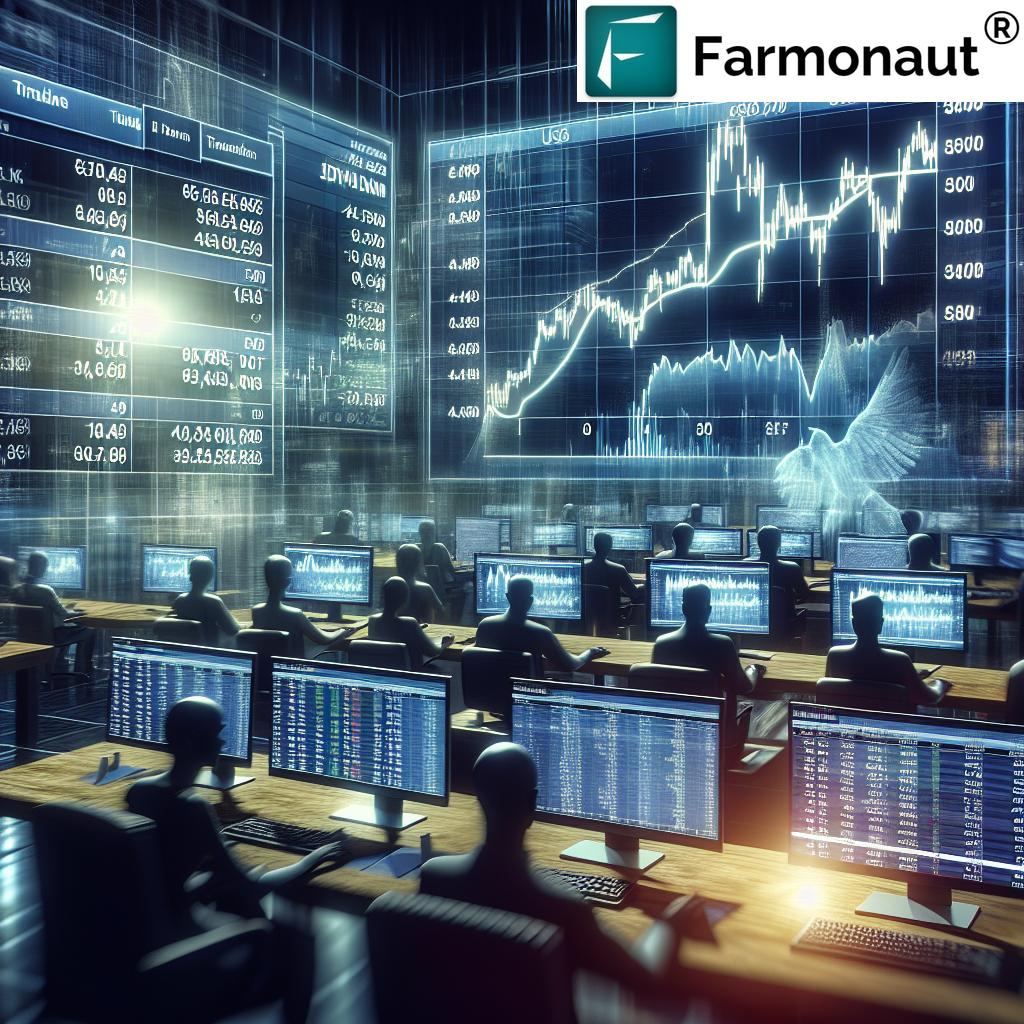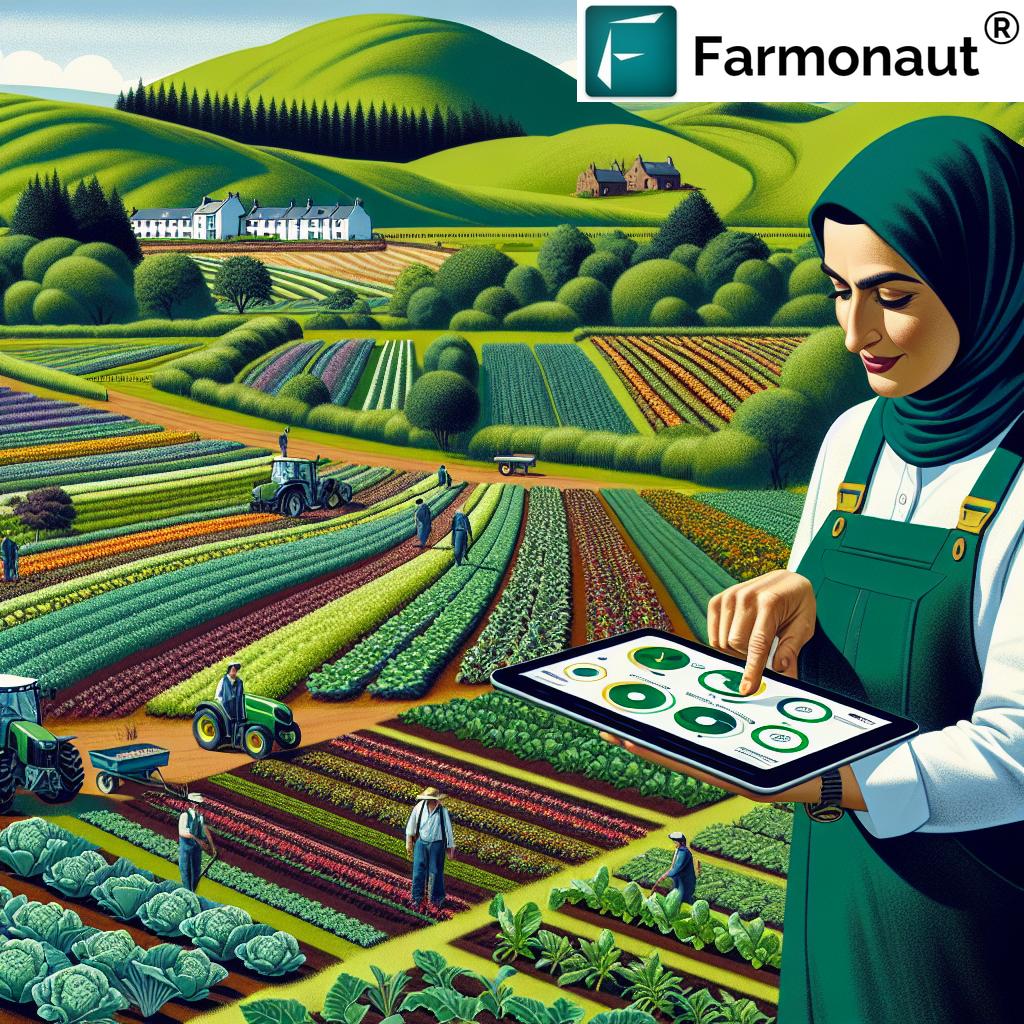Unlocking Sustainable Growth: A Deep Dive into UK Dividend Stocks and Responsible Investing Strategies
“UK dividend stocks’ performance can be assessed using metrics like debt-to-equity ratio, market cap trends, and P/E ratios.”
In today’s rapidly evolving financial landscape, sustainable income growth investing and UK dividend stocks have emerged as key focal points for investors seeking long-term wealth creation. As we navigate through the intricacies of investment trust performance and delve into comprehensive stock market analysis, we aim to provide you with valuable insights that will empower your investment decisions.
At Farmonaut, while our primary focus is on revolutionizing agriculture through technology, we understand the importance of diversified investments in creating a robust financial portfolio. That’s why we’re excited to explore the world of UK dividend stocks and responsible investing strategies with you.

Understanding Investment Trust Performance: A Case Study
To illustrate the dynamics of UK dividend stocks, let’s examine the recent performance of Dunedin Income Growth Investment Trust PLC (LON:DIG). This analysis will shed light on various aspects of stock market behavior and investment metrics.
Stock Price Movements and Trading Volume
During a recent trading session, Dunedin’s stock price experienced a notable decline, dropping below its fifty-day moving average. The stock traded as low as GBX 269.20 ($3.33) before settling at GBX 270.30 ($3.34). This movement occurred with a trading volume of 210,457 shares, indicating significant market activity.
Understanding these price movements and trading volumes is crucial for investors as they reflect market sentiment and liquidity. High trading volumes often suggest increased investor interest, which can lead to more volatile price movements.
Financial Health Indicators
Analyzing a company’s financial health is paramount when considering investment opportunities. For Dunedin Income Growth Investment Trust, we observe the following key metrics:
- Debt-to-Equity Ratio: 9.66
- Current Ratio: 1.10
- Quick Ratio: 0.82
- Market Capitalization: £384.37 million
- Price-to-Earnings Ratio: 1,802.00
- Beta: 0.73
Let’s break down these figures to understand their implications:
Debt-to-Equity Ratio Explained
The debt-to-equity ratio of 9.66 indicates that Dunedin has a substantial leverage position. This high ratio suggests that the company is financing a significant portion of its operations through debt rather than equity. While leverage can amplify returns, it also increases financial risk, especially during economic downturns.
Liquidity Measures
The current ratio of 1.10 suggests that Dunedin has sufficient short-term assets to cover its short-term liabilities. However, the quick ratio of 0.82, being below 1, indicates that the company might face challenges in meeting its immediate obligations without selling inventory or other less liquid assets.
Market Capitalization Trends
With a market capitalization of £384.37 million, Dunedin falls into the small-cap category. Market capitalization is a crucial metric as it reflects the total market value of a company’s outstanding shares. For investors, this figure helps in assessing the company’s size and risk profile relative to other investment options.
Price-to-Earnings Ratio Significance
The extraordinarily high price-to-earnings (P/E) ratio of 1,802.00 is particularly noteworthy. Typically, such a high P/E ratio could indicate that investors have high expectations for future growth or that the company’s earnings are currently depressed. However, it’s essential to compare this ratio with industry peers and historical trends to gain a more comprehensive understanding.
Stock Beta and Volatility
With a beta of 0.73, Dunedin’s stock is less volatile than the overall market. This lower beta suggests that the stock may offer some stability during market turbulence, which could be attractive for risk-averse investors seeking steady dividend income.
Dividend Analysis and Yield Calculation
Dividend yield calculation is a fundamental aspect of income investing. Let’s examine Dunedin’s recent dividend announcement and its implications:
- Announced Dividend: GBX 3.20 ($0.04)
- Distribution Date: February 28th
- Record Date: February 6th
- Ex-Dividend Date: February 6th
- Dividend Yield: 1.16%
- Payout Ratio: 9,333.33%
The dividend yield of 1.16% is calculated by dividing the annual dividend payment by the current stock price. While this yield might seem modest compared to some high-yield stocks, it’s important to consider the sustainability and growth potential of the dividend.
The extraordinarily high payout ratio of 9,333.33% raises concerns about the sustainability of the dividend. Typically, a payout ratio exceeding 100% indicates that the company is paying out more in dividends than it earns, which is not sustainable in the long term without additional sources of income or capital.
Responsible Investing Criteria and Sustainable Growth
Dunedin Income Growth Investment Trust’s focus on sustainable growth aligns with the growing trend of responsible investing. The trust primarily invests in companies listed or quoted in the United Kingdom, adhering to Sustainable and Responsible Investing (SRI) criteria.
This approach reflects a commitment to ethical investment practices, which can include considerations such as:
- Environmental impact and sustainability
- Social responsibility and corporate governance
- Long-term value creation
- Risk management through diversification
For investors, understanding these criteria is crucial as they not only contribute to positive societal impact but can also lead to more stable and sustainable returns over time.

Market Analysis and Expert Recommendations
Despite Dunedin’s established position in the market, current analyst recommendations paint a cautious picture. MarketBeat, a platform that tracks analyst recommendations, has assigned a “Hold” rating to Dunedin Income Growth Investment Trust.
This rating suggests that while analysts don’t foresee immediate significant downside risks, they also don’t expect substantial outperformance in the near term. It’s worth noting that MarketBeat has highlighted five other stocks that analysts currently recommend over Dunedin, indicating potentially better investment opportunities in the current market environment.
“Investors use stock beta and volatility measurements to evaluate risk in dividend-paying stocks and investment trusts.”
Comparative Analysis: UK Dividend Stocks
To provide a broader perspective on UK dividend stocks, let’s examine a comparative table of key metrics:
| Stock Name | Dividend Yield (%) | Price-to-Earnings Ratio | Debt-to-Equity Ratio | Market Capitalization (£ Billion) | 5-Year Total Return (%) |
|---|---|---|---|---|---|
| Dunedin Income Growth Trust | 1.16 | 1,802.00 | 9.66 | 0.384 | 15 |
| FTSE 100 Stock A | 4.5 | 15.2 | 0.8 | 50.2 | 35 |
| FTSE 250 Stock B | 3.2 | 22.5 | 1.2 | 2.8 | 28 |
| UK Small Cap Stock C | 2.8 | 18.7 | 0.5 | 0.75 | 40 |
| UK Dividend Aristocrat D | 5.1 | 12.3 | 1.5 | 25.6 | 45 |
This comparative analysis highlights the diverse landscape of UK dividend stocks. While Dunedin offers a lower yield compared to some peers, its extremely high P/E ratio and debt-to-equity ratio stand out. Investors should consider these metrics alongside other factors such as growth potential, market position, and overall financial health when making investment decisions.
The Role of Technology in Modern Investing
As we navigate the complexities of dividend investing and sustainable growth strategies, it’s crucial to recognize the role of technology in modern investing. At Farmonaut, we understand the importance of leveraging cutting-edge technology to make informed decisions, whether in agriculture or finance.
While our primary focus is on agricultural technology, the principles of data-driven decision-making apply equally to investment strategies. Just as farmers use our satellite-based crop health monitoring to optimize yields, investors can use advanced analytics and real-time data to refine their investment approaches.
Explore Farmonaut’s API for agricultural insights
Check out our API Developer Docs
Sustainable Investing and Environmental Considerations
The growing emphasis on sustainable and responsible investing aligns closely with global efforts to address environmental challenges. As investors increasingly factor environmental considerations into their decisions, companies that demonstrate strong environmental stewardship may gain competitive advantages.
In the agricultural sector, for instance, sustainable practices are becoming increasingly important. Farmonaut’s technologies, such as our satellite-based crop monitoring and AI-driven advisory systems, contribute to more sustainable farming practices by optimizing resource use and reducing environmental impact.
The Importance of Diversification in Investment Portfolios
While focusing on UK dividend stocks can provide steady income streams, it’s crucial to maintain a diversified investment portfolio. Diversification helps mitigate risks associated with market volatility and sector-specific challenges.
Consider spreading investments across:
- Different sectors (e.g., technology, healthcare, finance)
- Various asset classes (e.g., stocks, bonds, real estate)
- Geographic regions (beyond just the UK market)
- Company sizes (large-cap, mid-cap, small-cap stocks)
By diversifying, investors can potentially enhance returns while reducing overall portfolio risk.
The Impact of Economic Factors on Dividend Stocks
When investing in dividend stocks, it’s essential to consider broader economic factors that can influence performance. These may include:
- Interest rates
- Inflation
- GDP growth
- Currency exchange rates
- Geopolitical events
For example, rising interest rates can make dividend stocks less attractive compared to fixed-income investments, potentially impacting stock prices. Conversely, during periods of economic uncertainty, stable dividend-paying stocks may become more appealing to investors seeking reliable income streams.
The Future of Sustainable Income Growth Investing
As we look to the future, sustainable income growth investing is likely to continue gaining prominence. Investors are increasingly seeking opportunities that offer not just financial returns but also contribute positively to society and the environment.
Key trends to watch in this space include:
- Integration of ESG (Environmental, Social, and Governance) criteria into investment decisions
- Growing focus on companies with sustainable business models
- Increased transparency and reporting on sustainability metrics
- Development of new financial products focused on sustainable investing
These trends underscore the importance of staying informed and adaptable in the ever-evolving investment landscape.
Leveraging Technology for Investment Research
In today’s digital age, investors have access to a wealth of tools and resources for conducting thorough investment research. From financial news aggregators to advanced stock screening platforms, technology has democratized access to information that was once the exclusive domain of professional analysts.
At Farmonaut, we recognize the power of technology in decision-making processes. While our focus is on agricultural technology, the principles of data analysis and decision support systems apply equally to investment research. Our commitment to leveraging cutting-edge technology in agriculture mirrors the importance of using advanced tools in investment analysis.
The Role of Professional Financial Advice
While self-directed research is valuable, the complexity of financial markets often necessitates professional guidance. Financial advisors can provide personalized strategies that align with individual investment goals, risk tolerance, and time horizons.
When seeking professional advice, consider:
- The advisor’s qualifications and experience
- Their approach to sustainable and responsible investing
- Fee structures and potential conflicts of interest
- Their track record and client testimonials
Remember, just as farmers might seek expert advice on crop management strategies, investors can benefit from professional insights into portfolio management and investment selection.
Continuous Learning and Adaptation in Investing
The world of investing is dynamic, with new strategies, products, and market conditions constantly emerging. Successful investors commit to continuous learning and adaptation. This might involve:
- Staying updated on financial news and market trends
- Attending investment seminars and workshops
- Reading financial literature and expert analyses
- Engaging with investment communities and forums
At Farmonaut, we emphasize the importance of ongoing education in agriculture technology. Similarly, investors should view their journey as a continuous learning process, always seeking to refine their strategies and expand their knowledge base.
Conclusion: Navigating the Path to Sustainable Growth
As we’ve explored throughout this deep dive into UK dividend stocks and responsible investing strategies, the path to sustainable growth requires a multifaceted approach. From understanding key financial metrics and market trends to embracing responsible investing criteria and leveraging technology, successful investors must navigate a complex landscape.
While Dunedin Income Growth Investment Trust offers insights into the dynamics of dividend stocks, it’s crucial to view it as part of a broader investment ecosystem. The principles of diversification, continuous learning, and adaptation remain paramount in building a resilient and growth-oriented portfolio.
As you continue your investment journey, remember that tools and technologies can significantly enhance your decision-making process. Whether it’s advanced analytics in finance or satellite-based insights in agriculture, embracing innovation can lead to more informed and sustainable choices.
We at Farmonaut are committed to driving innovation in agriculture, and we encourage investors to seek out similarly innovative approaches in their financial strategies. By combining thorough research, responsible practices, and a forward-looking perspective, investors can work towards unlocking sustainable growth in their portfolios.
FAQ Section
- What is sustainable income growth investing?
Sustainable income growth investing focuses on companies that consistently increase their dividend payments over time, balancing current income with long-term growth potential. - How do I calculate dividend yield?
Dividend yield is calculated by dividing the annual dividend payment by the current stock price and multiplying by 100 to get a percentage. - What is a good debt-to-equity ratio?
A good debt-to-equity ratio varies by industry, but generally, a ratio below 2 is considered acceptable for most industries. - How does the price-to-earnings ratio affect investment decisions?
The P/E ratio helps investors assess whether a stock is overvalued or undervalued relative to its earnings. A high P/E might indicate high growth expectations or overvaluation. - What are responsible investing criteria?
Responsible investing criteria typically include environmental, social, and governance (ESG) factors that assess a company’s impact beyond financial performance.
















